Young children love music. They grow up exposed to it in their homes, schools and environments.
Here are 8 of the best music activities for preschoolers and kindergarteners, followed by 8 reasons why music is important for each childhood development.
The Top 8 Music Activities for Preschoolers
While there are numerous benefits of singing in early childhood, music education goes far beyond singing and includes rhyming, listening, playing with instruments, body percussion, dance, poetry, games, stories and more.
Here are some music activity ideas for kids.
1. Nursery Rhymes and Songs
During the preschool years children enjoy learning songs and nursery rhymes that have the following characteristics:
- They have repeated words and phrases in them
- There is a strong rhythm and beat in the song
- They have melodies
- They are about familiar topics e.g. animals and people
Preschoolers especially enjoy nonsense rhymes and poems.
2. Finger Rhymes
Finger plays build a child’s fine motor skills. Children develop finger control, strength and bilateral integration as they learn to coordinate their left and right hands together.
These are two of my favourite classic finger rhymes:
Two Little Dickey Birds
Two little dickey birds sitting on a wall, (both index fingers in the air, move both of them)
One named Peter, (wiggle one index finger) one named Paul (wiggle the other finger)
Fly away Peter, (draw the hand with “the Peter finger” behind your head and hide it)
fly away Paul (draw the other hand behind your head and hide it)
Come back Peter, (reverse the last action with “the Peter finger” hand)
Come back Paul. (reverse the last action with “the Paul finger” hand)
Where Is Thumbkin?
(Start with hands behind back)
Where is Thumbkin? Where is Thumbkin?
Here I am. (bring right hand to front, with thumb up)
Here I am. (bring left hand to front, with thumb up)
How are you this morning?
Very well, I thank you. (Wiggle thumbs as if they’re ‘talking’ together)
Run away. (hide right hand behind back)
Run away. (hide left hand behind back)
(Repeat rhyme with each finger: Pointer, Tall Man, Ring Man, and Pinkie)
3. Action Rhymes
Action rhymes encourage children to move their bodies and develop gross motor skills. They also teach children listening skills as they need to pay attention to the words in order to follow the actions.
Here is an example:
An Action Rhyme
Raise your hands above your head,
Clap them one, two, three,
Rest them now upon your hips,
Slowly bend your knees.
Up again and stand up tall,
Put your right foot out;
Shake your fingers.
Nod your head
And twist yourself about.
4. Instruments
Expose children to different kinds of instruments and let them experiment with making sounds. There are numerous benefits of musical instruments in preschool.
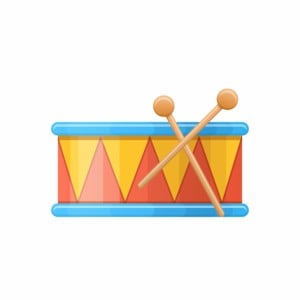
Here are some examples:
- shakers
- bells
- cymbals
- drums
- tambourines
- string instruments
- wind instruments
Making instruments can be a wonderful craft activity to incorporate into music lessons.
Here is a great resource of 52 instruments to make at home with your children.
5. Stories with Music
Play audiobooks that have a musical soundtrack, or listen to musical stories on YouTube.
These stories will develop listening skills and are far more interactive than watching TV as children need to actively listen to follow the story.
6. Poems
Listening to and repeating rhyming poems is an important activity as children learn to recognize rhythm and rhyme in a sentence.
The benefits of poetry are numerous, including developing vocabulary, language, phonological awareness, mathematical concepts, a love for literacy, etc.
7. Dancing
Dancing is a wonderfully freeing activity. It feels natural to children as they love expressing themselves through music and movement.
Dance to music often with your children. You can move freely to the music or make your own movements for your favourite songs.
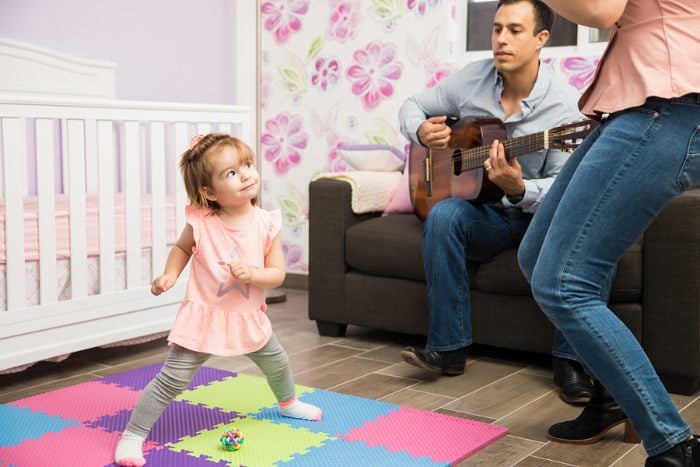
8. Musical Games
Play some fun music games that incorporate movement. Games such as musical statues or musical chairs are also good listening activities.
Movement forms an integral part of musical activities and should be incorporated as often as possible. In these activities, children gain all the benefits of music and simultaneously develop their motor skills.
What is the Importance of Music in Early Childhood?
The benefits of music are huge during the early years. It stimulates some of the following developmental areas:
1. Brain Development
Music builds overall brain development and creates pathways in the brain that improve a child’s cognitive functioning.
Language, reading and mathematical abilities, in particular, are developed through music activities. These are further explained below.
2. Language and Vocabulary
Songs and rhymes expand a child’s vocabulary and ability to use language correctly.
The repetition in popular rhymes and songs helps children to memorize new words. They also become familiar with language patterns and how words are placed together.
A well-developed vocabulary enables children to communicate effectively and learn to read with greater fluency and comprehension (to read for meaning).
3. Auditory Perception
Auditory perception is the brain’s ability to make sense of what it hears through the ears. This is one of the most important skills for reading.
Children must be able to hear various sounds, distinguish them from each other and manipulate them (e.g. blend an s and a t into one sound st to read the word stop). They must also be able to join sounds and break them apart in order to be able to read and spell words.
Teaching children classic songs and rhymes is one of the best ways to develop auditory perceptual skills. It is fun and children learn auditory skills with little effort.
Nonsense rhymes are great for tuning a child’s ear to sound patterns, especially rhyming patterns.
4. Sound Patterns
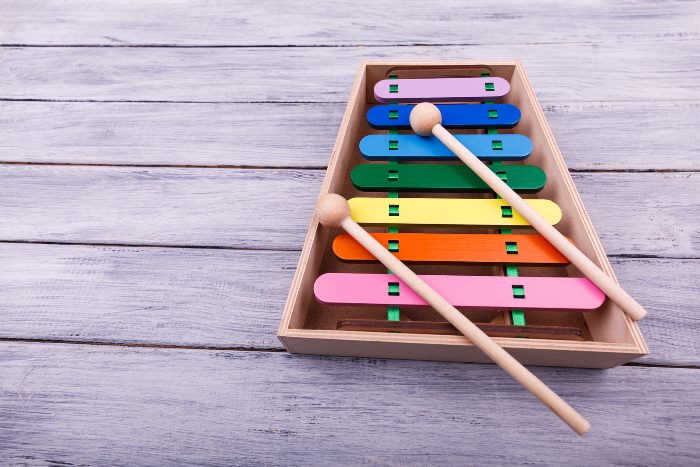
As stated above, sound patterns are learned through rhymes, poems and songs. These patterns emerge through:
- rhyming
- rhythm
- instruments
- syllables in words
- stress patterns in a song
- alliteration, etc.
Patterns form the basis of literacy and numeracy. Learning about patterning through musical activities will help a child cope academically when learning to read, write, spell and do maths.
5. Motor Skills
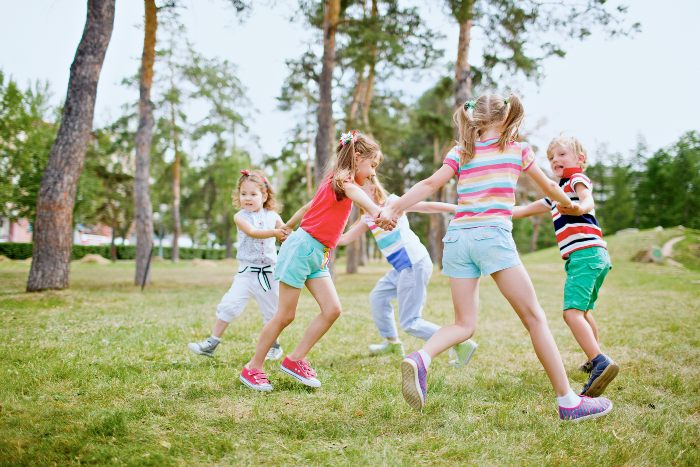
Motor skills are extremely important for learning to read and write. They are developed in various ways during musical activities.
Fine motor skills (the small muscles) can be developed through:
- Finger plays
- Action rhymes
- Playing with instruments
- Making instruments (e.g. a rice shaker)
Gross motor skills (the large muscles) can be developed through:
- Action rhymes
- Playing with large instruments
- Music games (e.g. musical statues)
- Dancing
Coordination, an important skill for children, can be learned through many musical activities. Music also improves sensory development, especially when paired with a movement activity such as dancing.
6. Self-Expression
Music is a wonderful mode of self-expression for children.
Through music activities, children develop a sense of creativity and feel free to express themselves without judgment. Creative expression is an important part of a child’s development.
7. Memory Skills
Children’s songs are usually filled with repetitive phrases, which helps them to develop memory skills.
The tune and rhythm of songs and rhymes makes it easier to memorize them. This is good for developing auditory skills as well as general memory skills, which a child will rely on throughout school and beyond.
8. General Well-Being
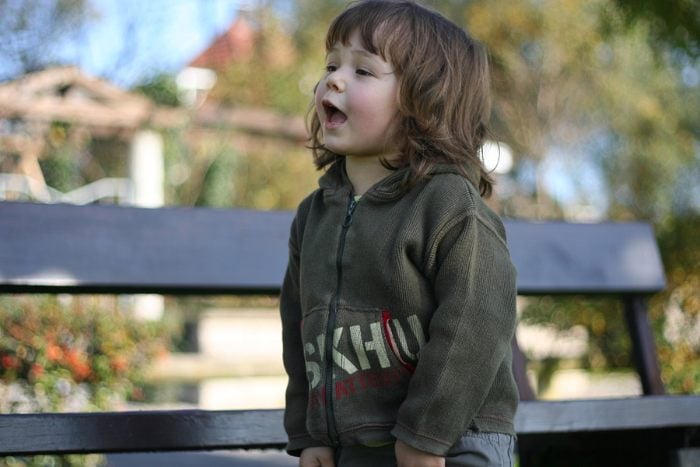
Music is simply a fun activity that makes you feel good.
Children are naturally drawn to music. They are not self-conscious when singing and are not held back by fear and judgment as adults may be. They relax, sing and move freely.
In today’s stressful society, an activity that relaxes a child and promotes general well-being should be encouraged frequently.
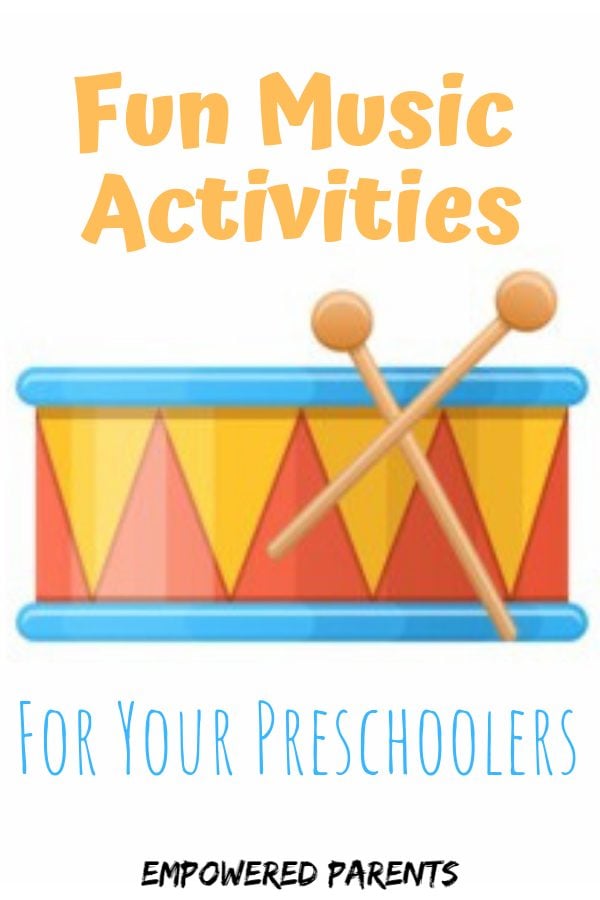
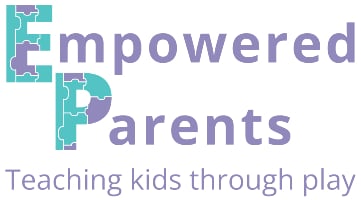
Joya Franklin
Sunday 20th of August 2023
Thankyou for all this information put together brief and with concrete examples
Keddy
Saturday 2nd of September 2023
Thanks for giving this information
Tanja Mcilroy
Tuesday 22nd of August 2023
I'm so pleased you found this helpful!